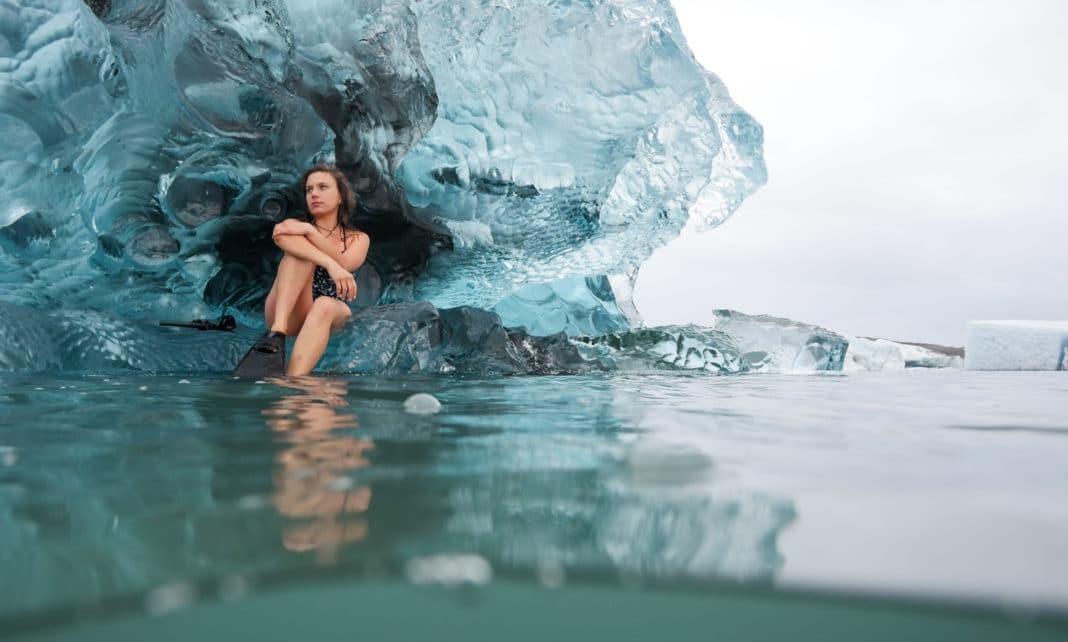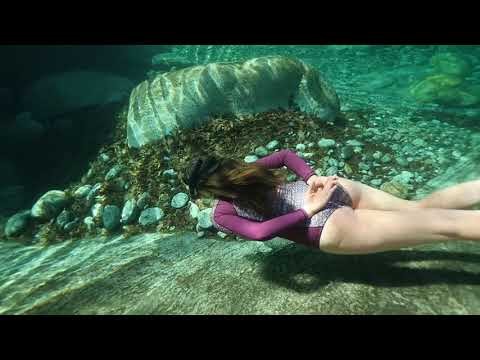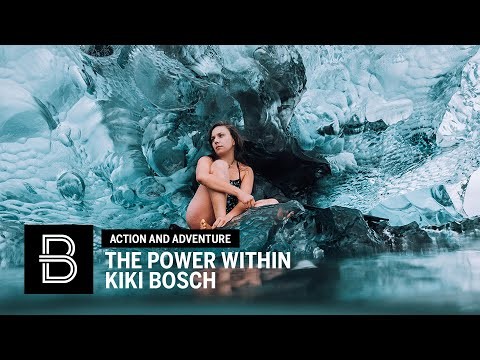Despite my intense dislike of the cold, rather perversely some of my favorite dives ever have taken place under the ice, and in freezing waters. Of course, it goes without saying that I have always had multiple layers of thermals, a heated vest, drysuit, and dry gloves. Whatever I can get my hands on to keep the cold water away! The thought of going in 2 degree Celsius / 36 degree Fahrenheit water in just a bikini is crazy, surely? Well, not for one woman. Meet Kiki Bosch. She is, without doubt, one of the worlds best ice freedivers. What she does I can barely comprehend. As far as I am concerned she has achieved things I will never get close to. For many reasons, she is a big inspiration to me as a scuba diver, as well as inspiring many other freedivers. To celebrate and applaud some of the water-women out there in the world pushing boundaries, I talk to Kiki about her life, her drive, and her passion for immersing herself in the icy waters around this planet.
DeeperBlue.com: So how would you describe yourself?
Kiki Bosch: It might always be hard to describe oneself in a conscious way. Often we get stuck in describing who we were in the past or hope to be in the future. Most important is that neither of those defines who we truly are. We are not our mistakes, not our victories, not our greatest achievement. Nor are we the plans we make for the future. Every day I aim to redefine myself. A person is always developing and learning from the decisions that they have made, both good and the bad. In my opinion, this perfectly reflects what you feel when you dive. You are not always your personal best, but every day you learn and explore new depths of your being, both within and outside the ocean. Some days we are crashing into the rocks, some days we are the calm under the surface. We just need to remember that both stem from the same body of water.
DB: Have you always been drawn to the water?
KB: Yes. As a child, I couldn’t get enough of swimming, though mostly indoors since I didn’t live by the sea. Water was always where I felt at home though. I was a junior open water scuba diver and loved every moment I could spend just sitting on the bottom of a swimming pool, and then later in the open ocean.
DB: You have chosen freediving, rather than my passion, scuba diving, as your focus. What attracted you to freediving over scuba, to begin with?
KB: When I was traveling through Latin America I picked up scuba diving after a break whilst at University. In the dive shop, I saw a poster from a freediver and asked about it. I started my first course the day after and simply fell in love with the sport. For me, freediving felt like I truly was part of the ocean, while on scuba I felt more like a visitor. I of course still love both sports for their own experience. But what I love most about freediving is simply the freedom of movement, as well as pushing your mind past its limits. The big mental aspect about freediving is that teaches you about your fears, beliefs, and attitudes. This then translates far beyond the water. Being able to explore my own inner state of mind in this way helped me a lot with overcoming trauma. Seeing the mind for what it is, and looking beyond and underneath the first few layers of it, is an experience on its own. Now when I freedive I enjoy both the exploration within myself and of the ocean itself!
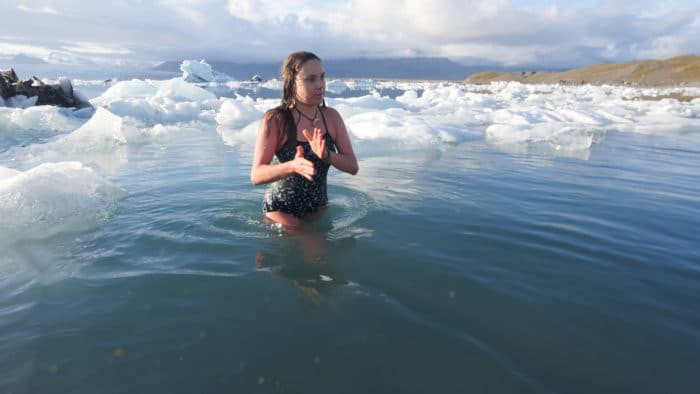
DB: A scuba diving friend of mine once said that he couldn’t imagine diving without the support of his equipment, yet you dive with nothing, in freezing temperatures. Do you ever feel nervous? And if so, how do you control it?
KB: Every time I go into freezing waters there is part of me that tells me it’s lunacy. But this is also the beauty of it because it reflects perfectly what we do in our day to day life. We hold on to thoughts we have about certain tasks. We label them as impossible. But once you get in there, control your breath, and focus on the warmth you have within your body, you realize that what you thought was not possible shifts and changes. All of a the sudden you can create your own, and totally new, reality. You realize that the fear you had is something you can overcome. Of course, time in the water is still limited in comparison to diving with scuba gear, but we are still capable of doing so much more than we think. There is so much potential within us that we have yet to discover. I use the cold to remind me of that. To remind me of the fact that if we stay calm, breathe and surrender to forces outside of us, we are able to dive through places that seemed like insanity. It is so empowering and invigorating.
DB: A lot of people say that freediving is as much about the mind as the body. Do you feel this is true?
KB: Honestly, I think it is way more about the mind than about the body. Most of the time it is our own belief and self-doubt that limits the body to achieve its full potential. Of course, you have to be healthy and take care of your body when doing extreme sports. But still, it is the mind that you mostly need to convince about the bodies capabilities. Training is important, and I don’t recommend for anyone to just jump into freezing cold water for freediving if they have never done it before. But with a little bit of training, I am positive that everyone is capable of doing the same thing as I do. The mental aspect can take more time than the physical aspect I find. You really have to build trust in yourself. You have to learn to trust your mind and your body in knowing its limits, as well as how far you can push those limits. Always take it one step at a time. In the end, I think it is a beautiful synergy and a truly holistic approach that works, where the mind supports the body and vice versa.
DB: Are there any special fitness requirements to dive in such cold water?
KB: Some of the contraindications to freediving in water that cold are heart problems, Renault’s syndrome, epilepsy, and mental health. But I believe that even with some of these conditions you can learn how to spend time in the water, or even freedive. It is about the process and tuning into your body. It’s important to take it slow while building up confidence in yourself though. What I would mostly recommend against is going out on your “own”, without the support of a trained person. Even if that is with friends or family. If they have never been in water that cold, it can be easy to panic. And it is panic that leads to the worst-case scenarios.
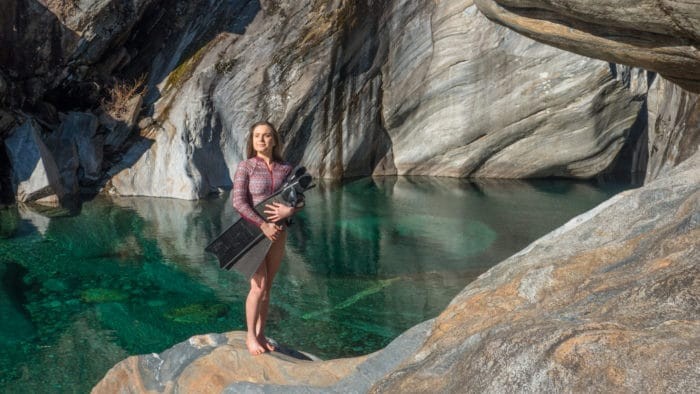
DB: What about gear? I know when scuba diving in cold water I wear as much as possible, but you don’t seem to layer up at all?
KB: Diving without gear gives me a big sense of freedom. Feeling the cold water swirl around me makes me focus on what I have within. The body is very smart and will always aim to keep the core temperature up. It is mostly your extremities that get cold. When I am in the water, I focus on keeping the heat in, rather than the cold out. I focus on what I have, rather than what I am trying to avoid.
DB: You survived one of the worst possible traumas anyone can face. People cope in many different ways with adversity. How did you discover that for you cold was such a healer?
KB: We all go through challenges in life, we all face adversity, we have all been hurt and have probably hurt others. Later, I realized that being assaulted itself wasn’t the real trauma. It was the repetition of my mind, the recurrence of it within my dreams, the various triggers that caused the panic attacks. And most importantly, the fact that I blamed myself for the decision I made at that moment of not reporting my abuser. When I got in the cold water, it was for the first time in months that my mind shut off, that I got into a meditative space. This was the first time where I was only dealing with the stressor at hand: the cold water. When I experienced this, it became a feeling I chased. Just to give myself a break from all the overthinking and rumination about the “mistakes” I made. In the cold, I could be compassionate towards myself. I learned how to deal with the stressor at hand rather than the ones of the past or the future. But after a while, and a lot of cold swims later, I realized that sometimes our life is one big cold stressor that looms around us. And that all we can do is be compassionate towards ourselves within these moments. In retrospect, we tend to remind ourselves of how things could have been, or should have been. But we often tend to forget that at that moment we didn’t know what we know now, or were not in a state of acting because we were going through the mental effects of the situation. Within the water, I learned a lot about myself and how to be present within the body, and within the moment. After all, I am massively grateful for whatever happened to me. The whole situation led me to so much self-discovery. Being able to share my story and help others that have gone through trauma is one of the most beautiful gifts I have been given.
DB: What advice would you give to someone who wanted to start freediving, let alone diving in such cold water as you do?
KB: Never dive alone of course. But also, look for a good mentor, a good trainer that can help you with whatever issues that come up in the cold water. Because if I look at my own experience, most of them are mental and having a good coach that can guide you through these challenges is most valuable of all. I think you learn the most when you are in a trusting environment where you can truly explore whatever comes up, emotions, fear or even past trauma.
I never cease to be amazed by how many strong, dedicated, and incredible women there are out there exploring our oceans. Kiki is a great example of one such woman. With her courage, both in her freediving and in her life, her internal philosophy inspires scuba divers, freedivers, and non-divers alike. The icy water she continually immerses herself in is a tribute to both her physical and mental strength. After all, as freedivers and divers, we should never forget the crucial part our minds play in helping us achieve our dreams. Freediving has a way of connecting us in a totally natural way to our oceans and the waters of our planet. With this interview, I want you to be inspired, and to go out and experience the amazing mental and physical peace that the water can bring you.

